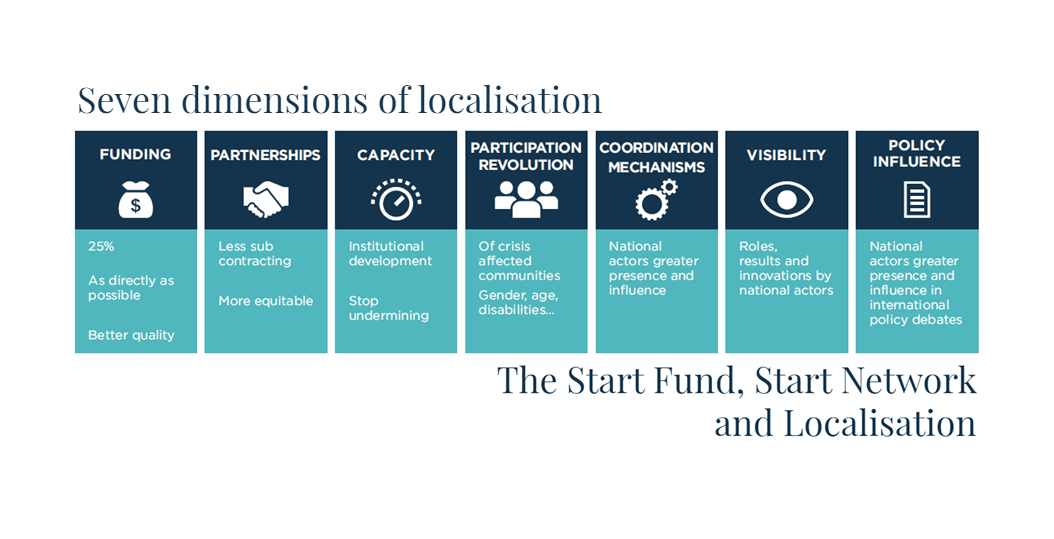Start Network's Localisation Framework has been updated in 2021 and is available to view here.
The Start Network has published a new framework for localisation which aims to provide a practical structure to improve the position of local organisations within international aid.
It is widely acknowledged that localisation can help solve many of the problems faced in the international humanitarian system, such as slow international response to crises and the high cost of international intermediaries. However, until now localisation had not been afforded a broad definition, whilst international agreements focused only on financial targets.
The new framework published today takes a deeper and more critical view of localisation, looking at the quality (not just the quantity) of funding, partnerships and participation, capacity development, and the influence of local and national organisations. In publishing the framework the Start Network seeks to promote granularity in the sector’s understanding of localisation, in order to foster a holistic approach to addressing it. Start Network also seeks to take a self-critical view to drive meaningful action towards transformative localisation.
The framework has been published as part of a detailed external review, The Start Fund, Start Network and Localisation, which looks at how the Start Network’s programmes are faring on the localisation agenda. The review aimed to understand how the Start Fund and three projects within the Disasters and Emergencies Preparedness Programme were already contributing to localisation, using the new framework as a lens, while providing recommendations for the future.
Responding to the review, the Start Network has set out details of how the recommendations will be taken forward. One area will be through the Start Fund Bangladesh, set up earlier this year to put funding and decision making into the hands of humanitarian groups closer to the communities most affected by disasters. Over the coming months Start Fund Bangladesh will pilot greater localisation by enabling trusted national and local NGOs to access Start Funds directly and participate in allocation and project selection committees.
More ambitious longer terms actions will be developed, such as opening access to a wider set of non-member national and local NGOs to the global Start Fund and the creation of a policy that sets a minimum management fee allocation for local or national partners. In other areas the Start Network will work to build a body of evidence to monitor and analyse the quantity and quality of partnerships. It will also develop and implement an enhanced communications and visibility plan to promote the roles, contributions, and achievements of national and local organisations.
Sean Lowrie, Director of the Start Network said: “Localisation is a central and non-negotiable principle of Start Network and we are doing more than many to foster localisation in our programmes. For example, in the third year of the Start Fund each project selection meeting was held in the country or region affected, enabling the people closest to those crises decide how money is spent.
“We are committed to taking the action needed to drive a holistic and transformative approach to localisation. This review provides us with a robust framework by which we can better understand it and the ways in which we can take action to improve it.”
Sajid Raihan, Country Manager of the Start Fund Bangladesh said “The Start Fund Bangladesh demonstrates how the Start Network is taking practical action on localisation. As well as incorporating localised decision making and partner participation into the Fund, we will also pilot ways in which trusted national and local NGOs equal status to access Start Funds directly and participate in allocation and project selection committees. Whilst funding as directly as possible is a long-term action, localised decision making and partner participation are both currently or soon to be incorporated."
Smruti Patel and Koenraad Van Brabant, authors of the review said “To date, localisation lacks a framework in any clearly defined form. In its absence, it was necessary to develop one ourselves for this exercise. The framework contained in this report is likely the most comprehensive one currently available and can serve to structure, focus and inform the debate.”
The report will be presented in discussion during a Start Fund learning webinar in September.
Read David Jones' blog about the challenges of unlocking localisation.
Download The Start Fund, Start Network and Localisation full report.
Download The Start Fund, Start Network and Localisation Executive Summary.
Read the Start Network Management Response to the localisation review.

